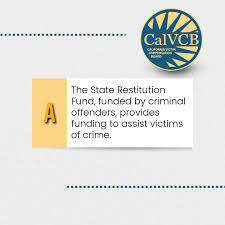Cal. Pen. Code Section 1202.4: In Part states:
Restitution-->
(a)(1). It is the intent of the Legislature that a victim of crime who incurs an economic loss as a result of the commission of a crime shall receive restitution directly from a defendant convicted of that crime.
(2) Upon a person being convicted of a crime in the State of California, the court shall order the defendant to pay a fine in the form of a penalty assessment in accordance with Section 1464……,
Under existing law: Courts impose restitution fines as part of sentencing, with funds deposited into the Restitution Fund. Assembly Bill (AB) 1186, signed into law on September 28, 2024, and effective January 1, 2025 introduced changes to the collection of restitution fines in California.
Implementation of AB1186 – Changes to Restitution Fines:
Summary and Background provided by CDCR (below):
Under existing law:
□ Courts impose restitution fines as part of sentencing, with funds deposited into the Restitution Fund.
□ Juvenile courts could also impose restitution fines on minors
adjudged wards of the court.
What’s Changing?
Effective January 1, 2025, AB 1186 introduces the following updates:
□ Restitution fines and related fees become unenforceable and uncollectible 10 years after the date they are imposed by the court (excluding fines under Penal Code section 1202.45). This does not include direct orders of restitution for victims.
□ Juvenile restitution fines are eliminated, aligning with the closure of the Division of Juvenile Justice in June 2023.
Understanding Restitution: Fines vs. Direct Orders
When a person is convicted of a crime, the court may impose two (2) types of restitution:
Restitution fines:
□ A set amount paid to the Restitution Fund, which supports victims of crime through the California Victim Compensation Board.
□ These fines are unrelated to specific victims and are based on
the nature of the offense.
Direct orders of restitution:
□ Compensation paid directly to victims to cover losses caused by the incarcerated person (e.g., medical bills, lost wages, property damage).
□ Direct orders are case-specific and enforceable until fully paid.
Important Note:
Assembly Bill (AB) 1186 impacts restitution fines only. Direct orders of restitution remain unaffected and continue to be collected.
Implementation Details
The Office of Victim and Survivor Rights and Services (OVSRS) is updating the Trust Restitution Accounting and Canteen System (TRACS) to comply with AB 1186.
Key actions include:
□ Automatic termination of collections for restitution fines:
o Starting January 1, 2025, TRACS will stop collection on restitution fines imposed more than 10 years ago.
o Moving forward, collections will automatically cease 10 years after the fine’s imposition date.
o Juvenile restitution fines are no longer collected as of June 2023.
Key Notes:
• AB 1186 impacts restitution fines only; there are no changes to the collection of direct orders of restitution.
• Additional fines may be imposed in some cases alongside the restitution fine. These auxiliary fines are typically stayed and only enforced if the individual does not successfully complete parole. They are not commonly issued and function as supplementary penalties.
• The “Date of Imposition” refers to the sentencing date listed on the Abstract of Judgment or Court Minute Order.
• No refunds will be issued for collections made before January 1, 2025.
EDITOR’s OPINION: AB 1186's provision limiting the enforceability of misdemeanor restitution orders after 10 years offers several societal benefits. Primarily, it acknowledges the realities of recidivism and the counterproductive nature of perpetually burdening individuals with debt, especially for lower-level offenses. By providing a defined timeframe for restitution in misdemeanor cases, the bill offers a pathway for offenders to reintegrate into society without the crushing weight of unpayable debt, which can often be a barrier to employment, housing, and overall stability.
This promotes rehabilitation and reduces the likelihood of reoffending driven by economic desperation. Furthermore, it focuses resources on collecting restitution in more serious felony cases where the impact on victims is often greater and the need for restitution may be more pressing. This targeted approach allows for more efficient allocation of law enforcement and court resources, ultimately benefiting society by prioritizing the most impactful cases and promoting successful reintegration for misdemeanor offenders.
For further questions or clarifications, contact the Office of Victim and Survivor Rights and Services, Restitution Services Unit at: CDCRRestitution@cdcr.ca.gov or
Phone 1-877-256-6877


No comments:
Post a Comment